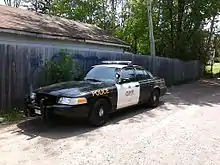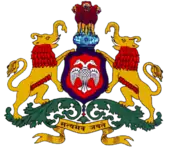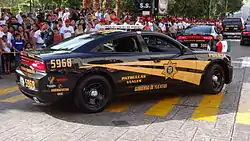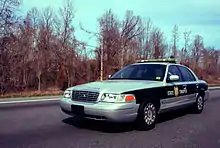State police
State police or provincial police are a type of sub-national territorial police force found in nations organized as federations, typically in North America, South Asia, and Oceania. These forces typically have jurisdiction over the relevant sub-national jurisdiction, and may cooperate in law enforcement activities with municipal or national police where either exist.
_(10585073613).jpg.webp)
Argentina
In Argentina, as a federal country, each province has its own independent police force and its responsible of its funding, training and equipment. State police agencies are responsible of all the territory of a determinate state. There is almost no municipal/local law enforcement in Argentina, and if there is, is limited to traffic duties.
Australia
Each state of Australia has its own state police force. Municipalities do not have police forces and it is left to the state forces to police all geographic areas within their respective states. Australia does have a national police force, the Australian Federal Police, whose role is to enforce the laws of the Commonwealth, both criminal law and civil law, as well as to protect the interests of the Commonwealth, both domestically and internationally. The AFP does, however, provide 'state' policing for the Australian Capital Territory, Jervis Bay Territory, and Australia's other external territories such as Norfolk Island, Christmas Island and the Cocos (Keeling) Islands.[1] Prior to the Federation of Australia, each Colony within Australia had numerous police forces, but these were largely amalgamated well before Federation.
Brazil
Each state in Brazil has two state police forces:
- Civil Police — the State criminal investigative police.
- Military Police — they are uniformed gendarmerie forces fulfilling roles as State police. They are a reserve branch of the Brazilian armed forces[2] but do not perform regular Military Police duties as they are performed by service police such as the Army Police, etc.
- PCAC - Polícia Civil do Estado do Acre
- PMAC - Polícia Militar do Estado do Acre
- PCAL - Polícia Civil do Estado de Alagoas
- PMAL - Polícia Militar do Estado de Alagoas
- PCAP - Polícia Civil do Estado do Amapá
- PMAP - Polícia Militar do Estado do Amapá
- PCAM - Polícia Civil do Estado do Amazonas
- PMAM - Polícia Militar do Estado do Amazonas
- PCBA - Polícia Civil do Estado da Bahia
- PMBA - Polícia Militar do Estado da Bahia
- PCCE - Polícia Civil do Estado do Ceará
- PMCE - Polícia Militar do Estado do Ceará
- PCDF - Polícia Civil do Distrito Federal
- PMDF - Polícia Militar do Estado do Distrito Federal
- PCES - Polícia Civil do Estado do Espírito Santo
- PMES - Polícia Militar do Estado do Espírito Santo (en)
- PCGO - Polícia Civil do Estado de Goiás
- PMGO - Polícia Militar do Estado de Goiás (en)
- PCMA - Polícia Civil do Estado do Maranhão
- PMMA - Polícia Militar do Estado do Maranhão
- PCMT - Polícia Civil do Estado do Mato Grosso
- PMMT - Polícia Militar do Estado do Mato Grosso
- PCMS - Polícia Civil do Estado do Mato Grosso do Sul
- PMMS - Polícia Militar do Estado do Mato Grosso do Sul
- PCMG - Polícia Civil do Estado de Minas Gerais
- PMMG - Polícia Militar do Estado de Minas Gerais (en)
- PCPA - Polícia Civil do Estado do Pará
- PMPA - Polícia Militar do Estado do Pará
- PCPB - Polícia Civil do Estado da Paraíba
- PMPB - Polícia Militar do Estado da Paraíba
- PCPR - Polícia Civil do Estado do Paraná
- PMPR - Polícia Militar do Estado do Paraná (en)
- PCPE - Polícia Civil do Estado de Pernambuco
- PMPE - Polícia Militar do Estado de Pernambuco
- PCPI - Polícia Civil do Estado do Piauí
- PMPI - Polícia Militar do Estado do Piauí
- PCERJ - Polícia Civil do Estado do Rio de Janeiro (en)
- PMERJ - Polícia Militar do Estado do Rio de Janeiro (en)
- PCRN - Polícia Civil do Estado do Rio Grande do Norte
- PMRN - Polícia Militar do Estado de Rio Grande do Norte
- PCRS - Polícia Civil do Estado do Rio Grande do Sul
- BMRS - Brigada Militar do Rio Grande do Sul
- PCRO - Polícia Civil do Estado de Rondônia
- PMRO - Polícia Militar do Estado de Rondônia
- PCRR - Polícia Civil do Estado de Roraima
- PMRR - Polícia Militar do Estado de Roraima
- PCSC - Polícia Civil do Estado de Santa Catarina
- PMSC - Polícia Militar do Estado de Santa Catarina
- PCESP - Polícia Civil do Estado de São Paulo
- PMESP - Polícia Militar do Estado de São Paulo (en)
- PCSE - Polícia Civil do Estado de Sergipe
- PMSE - Polícia Militar do Estado de Sergipe
- PCTO - Polícia Civil do Estado do Tocantins
- PMTO - Polícia Militar do Estado do Tocantins
Canada

Law enforcement in Canada operates at the federal, provincial, and local levels. Three provinces of Canada have a dedicated police force, with jurisdiction over some or all of the province:
- Ontario Provincial Police (Ontario)
- Royal Newfoundland Constabulary (Newfoundland and Labrador: St. John's Metropolitan Area, Corner Brook, and Labrador West only)
- Sûreté du Québec (Quebec)
The federal Royal Canadian Mounted Police (RCMP) provides provincial-level policing in the remaining land area of Newfoundland and Labrador, as well as the remaining seven provinces and three territories. The RCMP began being contracted to provide provincial policing in the late 1920s as provincial police forces were disbanded and their duties contracted out to provincial divisions of the RCMP. The last provincial police force to be disbanded, the British Columbia Provincial Police, existed from the mid-19th century until its jurisdiction was transferred to RCMP "E" Division on August 15, 1950.
Provinces which have disbanded their provincial police may retain other provincial law enforcement agencies, such as sheriff services or conservation officers. For example: the Alberta Sheriffs Branch is responsible for traffic enforcement in Alberta together with the RCMP, while not being a true police force.
Germany
The Landespolizei (or LaPo) is a term used in the Federal Republic of Germany to denote the law enforcement services that perform law enforcement duties in the States of Germany. The German federal constitution leaves the majority of law enforcement responsibilities to the 16 states of the country.
- Baden-Württemberg Police
- Bavarian State Police
- Berlin Police
- Brandenburg Police
- Bremen Police
- Hamburg Police
- Hesse State Police
- Lower Saxony Police
- Mecklenburg-Vorpommern Police
- North Rhine-Westphalia Police
- Rhineland-Palatinate Police
- Saarland Police
- Saxony Police
- Saxony-Anhalt Police
- Schleswig-Holstein Police
- Thuringia Police
There also are several auxiliary state police forces.
India
Each state and union territory has a state police force and its own distinct State Police Services, headed by the Commissioner of Police (State) or Director General of Police (DGP) who is an Indian Police Service officer. The IPS is not a law enforcement agency in its own right; rather it is the body to which all senior police officers of all states belong regardless of the agency for whom they work. The state police is responsible for maintaining law and order in townships of the state and the rural areas.
In addition to the state police, major cities have their own police force called Metropolitan Police which is quite similar to other normal police forces except their different rank designations; e.g., DGP is called as Commissioner of Police (State) in a state with Metropolitan Police.
| SrNo | State/Union Territory | Police Emblem | Police Force |
|---|---|---|---|
| 1 | Andaman and Nicobar Island (Union Territory) | Andaman Nicobar Islands Police | |
| 2 | Andhra Pradesh | Andhra Pradesh Police | |
| 3 | Arunachal Pradesh | Arunachal Pradesh Police | |
| 4 | Assam | Assam Police | |
| 5 | Bihar | Bihar Police | |
| 6 | Chandigarh (Union Territory) | Chandigarh Police | |
| 7 | Chhattisgarh | Chhattisgarh Police | |
| 8 | Dadra and Nagar Haveli and Daman and Diu | Dadra and Nagar Haveli and Daman and Diu Police | |
| 9 | Delhi | Delhi Police | |
| 10 | Goa | Goa Police | |
| 11 | Gujarat | Gujarat Police | |
| 12 | Haryana | Haryana Police | |
| 13 | Himachal Pradesh | Himachal Pradesh Police | |
| 14 | Jammu and Kashmir (Union Territory) | Jammu and Kashmir Police | |
| 15 | Jharkhand | Jharkhand Police | |
| 16 | Karnataka |  |
Karnataka Police |
| 17 | Kerala | Kerala Police | |
| 18 | Ladakh (Union Territory) | Ladakh Police | |
| 19 | Lakshadweep (Union Territory) | Lakshadweep Police | |
| 20 | Madhya Pradesh | Madhya Pradesh Police | |
| 21 | Maharashtra | Maharashtra Police | |
| 22 | Manipur | Manipur Police | |
| 23 | Meghalaya | Meghalaya Police | |
| 24 | Mizoram | Mizoram Police | |
| 25 | Nagaland | Nagaland Police | |
| 26 | Odisha | Odisha Police | |
| 27 | Puducherry | Puducherry Police | |
| 28 | Punjab | Punjab Police | |
| 29 | Rajasthan | Rajasthan Police | |
| 30 | Sikkim | Sikkim Police | |
| 31 | Tamil Nadu | Tamil Nadu Police | |
| 32 | Telangana | Telangana Police | |
| 33 | Tripura | Tripura Police | |
| 34 | Uttar Pradesh | Uttar Pradesh Police | |
| 35 | Uttarakhand | Uttarakhand Police | |
| 36 | West Bengal | West Bengal Police |
Indonesia
Each of the provinces of Indonesia have their own "Regional Police" (Indonesian: Kepolisian Daerah), which is under the guidance of the central Indonesian National Police headquarters. Until 1984, the Regional Polices were called in military-style "Police Regional Command" (Indonesian: Komando Daerah Kepolisian). Each Regional police which is responsible for law enforcement in a province is commanded by a brigadier or inspector general.
|
|
|
|
Mexico
Each of the 31 states of Mexico maintains a separate law enforcement agency or Policía Estatal. Each of these state forces is tasked with the protection of their citizens, keeping local order and combating insecurity and drug trafficking. Certain states including Veracruz and Nuevo León have a new model of police force designated as Civilian Forces (Fuerza Civil).
- Aguascalientes State Police
- Baja California State Police
- Baja California Sur State Police
- Campeche State Police
- Chiapas State Police
- Chihuahua State Police
- Coahuila State Police
- Colima State Police
- Federal District Police
- Durango State Police
- Guanajuato State Police
- Guerrero State Police
- Hidalgo State Police
- Jalisco State Police
- State of Mexico Police
- Michoacán State Police
- Morelos State Police
- Nayarit State Police
- Nuevo León Civil Force
- Oaxaca State Police
- Puebla State Police
- Querétaro State Police
- Quintana Roo State Police
- San Luis Potosí State Police
- Sinaloa State Police
- Sonora State Police
- Tabasco State Police
- Tamaulipas State Police
- Tlaxcala State Police
- Veracruz State Police
- Yucatán State Police
 A Dodge Charger of the state police of Yucatán in a parade.
A Dodge Charger of the state police of Yucatán in a parade. - Zacatecas State Police
Spain
In Spain there are autonomous police forces in four autonomous communities (Ertzainas in the Basque Country, Mossos d'Esquadra in Catalonia, Policía Foral in Navarre and Policía Canaria in the Canary Islands).
United States

In the United States, state police (also called state troopers or highway patrol) are a police body unique to 49 of the U.S. states, having statewide authority to conduct law enforcement activities and criminal investigations. Hawaii, being a widely dispersed archipelago, has four separate county-based police agencies, rather than a single statewide police agency.
In general, these police agencies perform functions outside the jurisdiction of the county sheriff, such as enforcing traffic laws on state highways and interstate expressways, overseeing the security of the state capitol complex, protecting the governor, training new officers for local police forces too small to operate an academy, providing technological and scientific services, supporting local police and helping to coordinate multi-jurisdictional task force activity in serious or complicated cases in those states that grant full police powers statewide. A general trend has been to bring all of these agencies under a state Department of Public Safety. Additionally, they may serve under different state departments such as the Highway Patrol under the state Department of Transportation and the Marine patrol under the state Department of Natural Resources.
Twenty-two U.S. states use the term "State Police", fifteen use the term "Highway Patrol", seven use the term "State Patrol", three use the term "State Highway Patrol", while Alaska's agency is the "Division of Alaska State Troopers" and Arkansas has a "Highway Police" in addition to its "State Police". The term "highway patrol" tends to be more common in the southeast and mountain west States.
- Alabama Highway Patrol
- Alaska State Troopers
- Arizona Highway Patrol
- Arkansas State Police
- Arkansas Highway Police
- California Highway Patrol
- Colorado State Patrol
- Connecticut State Police
- Delaware State Police
- Florida Highway Patrol
- Georgia State Patrol
- Hawaii State Sheriff
- Idaho State Police
- Illinois State Police
- Indiana State Police
- Iowa State Patrol
- Kansas Highway Patrol
- Kentucky State Police
- Louisiana State Police
- Maine State Police
- Maryland State Police
- Massachusetts State Police
- Michigan State Police
- Minnesota State Patrol
- Mississippi Highway Patrol
- Missouri State Highway Patrol
- Montana Highway Patrol
- Nebraska State Patrol
- Nevada Highway Patrol
- New Hampshire State Police
- New Jersey State Police
- New Mexico State Police
- New York State Police
- North Carolina State Highway Patrol
- North Dakota Highway Patrol
- Ohio State Highway Patrol
- Oklahoma Highway Patrol
- Oregon State Police
- Pennsylvania State Police
- Rhode Island State Police
- South Carolina Highway Patrol
- South Dakota Highway Patrol
- Tennessee Highway Patrol
- Texas Highway Patrol
- Utah Highway Patrol
- Vermont State Police
- Virginia State Police
- Washington State Patrol
- West Virginia State Police
- Wisconsin State Patrol
- Wyoming Highway Patrol
In addition, all the territories of the United States have a police force with similar territory-wide authority:
See also
References
- "AFP across the world". afp.gov.au. 26 February 2016.
- "Brazilian Laws - the Federal Constitution - Defense of State and Democratic Institutions". v-brazil.com.
